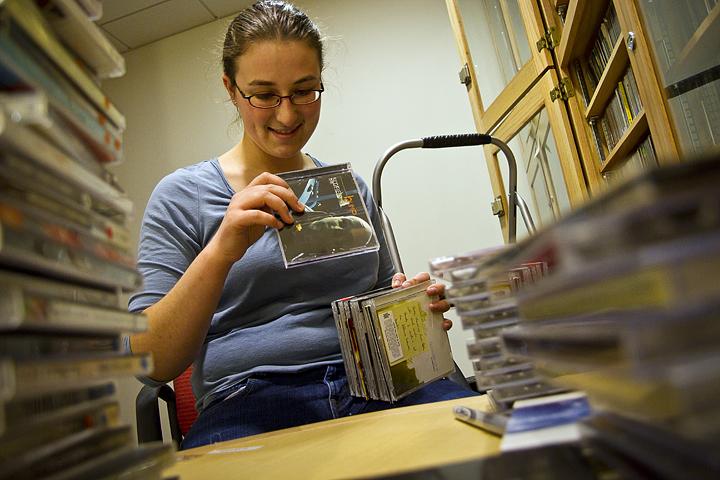Kelly Musselman ’11 walked into the mishmash of music in the KDIC library and decided that something needed to be done. Since the start of this semester, she and the limited staff of the radio station have been alphabetizing and organizing nearly every CD. By the time they are finished at the end of this semester, they hope to open the music library to everyone on campus.

“I was just tired of people getting paid out of our budget, out of our school’s money, without doing anything but getting DJs on the air,” Musselman said.
This year, KDIC faced one of its lowest budgets in years despite the recent turn around. The staff had to work with Student Publications and Radio Committee (SPARC) to negotiate and find more funds because the budget was finalized on the basis of previous years’ inactivity.
“It got cut from what it was, from years past. … And a large reason for that was just sort of a disparity between how much budget was given versus how many hours were being worked,” said SPARC Co-Chair Johnny Buse ’11.
However, the KDIC staff, under Musselman’s guidance, worked hard to prove that the 40-year-old radio station could still be a functional aspect of campus.
“They had some really good plans for cataloguing … the CDs and vinyls that they have,” Buse said. “They’ve already done tremendous work in terms of getting the CDs and vinyls on the shelves.”
The music library will hopefully be catalogued by the end of the semester, when it will be available for student check-out several days a week. The staff plans to use the existing online catalogue at kdic.grinnell.edu to provide interested students with a list of available music.
Despite losing two librarians at the beginning of this semester, Musselman and the head librarian, Tucker Bush ’12, succeeded in enlisting the help of two more students. However, SPARC did not entirely authorize payment for two additional librarians. Instead, SPARC is dipping into their discretionary funds in lieu of using budgeted money under the condition that they remain involved in the process of establishing the music library.
“They’ve designated the library as ‘SPARC Space.’ … SPARC has control over the money that gets paid to them,” Musselman said. “They’re going to check in with us and make sure things are still going forward.”
Musselman attributes this to the KDIC’s disorganized track record and hopes that this year’s staff will be able to prove that the radio station and library deserve another chance.
Sara Sanders ’14 continues to work in the library despite the ambiguous nature of her paycheck.
“SPARC found a way to negotiate a budget that will pay [me] $200 a semester assuming we can prove that the library will actually be useful and that we are actually doing work on it,” Sanders said. “It’s kind of more like I’m volunteering myself right now, but I will be paid later.”
Both Sanders and Musselman indicate that they expect SPARC to be impressed with the strides made so far with the music library and that the “SPARC space” system will soon be put to rest. In the future, KDIC will hopefully be a functional music library and radio station that will provide students with a variety of opportunities.
“If you have a library that students can come use and not just for the DJs to browse,” Sanders said, “in that way KDIC becomes a part of the community as a whole instead of just for DJs.”




























































